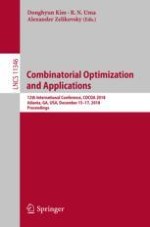2018 | OriginalPaper | Buchkapitel
Inefficiency of Equilibria in Doodle Polls
verfasst von : Barbara M. Anthony, Christine Chung
Erschienen in: Combinatorial Optimization and Applications
Aktivieren Sie unsere intelligente Suche, um passende Fachinhalte oder Patente zu finden.
Wählen Sie Textabschnitte aus um mit Künstlicher Intelligenz passenden Patente zu finden. powered by
Markieren Sie Textabschnitte, um KI-gestützt weitere passende Inhalte zu finden. powered by
